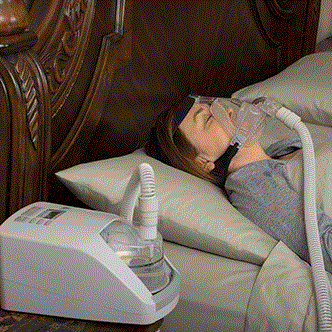
A simple mask that improves breathing during sleep could prevent an abnormal heartbeat in patients with atrial fibrillation (AFib), according to a comprehensive review of past studies.
Published in JACC Clinical Electrophysiology, this study analyzed data from past trials focused on treating sleep apnea in patients with atrial fibrillation, the most common type of irregular heart rhythm. Obstructive sleep apnea is a common condition in which breathing is briefly and repeatedly interrupted during sleep. Although many view sleep apnea as more of a nuisance, sleep apnea has been linked to a number of serious conditions, including atrial fibrillation. Not only can sleep apnea cause AFib, it can trigger an abnormal heartbeat in patients already living with this condition.
To see whether sleep apnea treatment helps reduce episodes of AFib, researchers analyzed data from seven studies that included more than 1,000 patients with AFib and sleep apnea. In all seven studies, patients were treated with continuous positive airway pressure (CPAP), which is a mask worn during sleep to prevent apnea and snoring. Researchers also tracked patients’ cardiovascular health to compare the number of AFib episodes in different study groups.
After analysis, researchers found that CPAP use nearly cut risk of AFib episodes in half, even after taking into account differences in AFib treatments. Those using CPAP were 42% less likely to experience an abnormal heart rhythm than those not receiving such treatment.
This study is among the largest of its kind to demonstrate the benefits of sleep apnea treatment in patients with AFib. Although there are multiple studies on the topic, most were small and had varied outcomes. This most recent review, which included more than 1,000 patients, helps provide more compelling evidence that CPAP helps significantly reduce episodes of AFib.
However, it’s important to point out that CPAP is not the only treatment for sleep apnea. For patients with mild sleep apnea, simple lifestyle changes like weight loss and quitting smoking may be enough to treat the condition. Healthy lifestyle choices can also go a long way in preventing ever developing both sleep apnea and atrial fibrillation. But for patients already diagnosed with both sleep apnea and atrial fibrillation, CPAP may be an effective way to promote normal breathing and a healthy heartbeat.